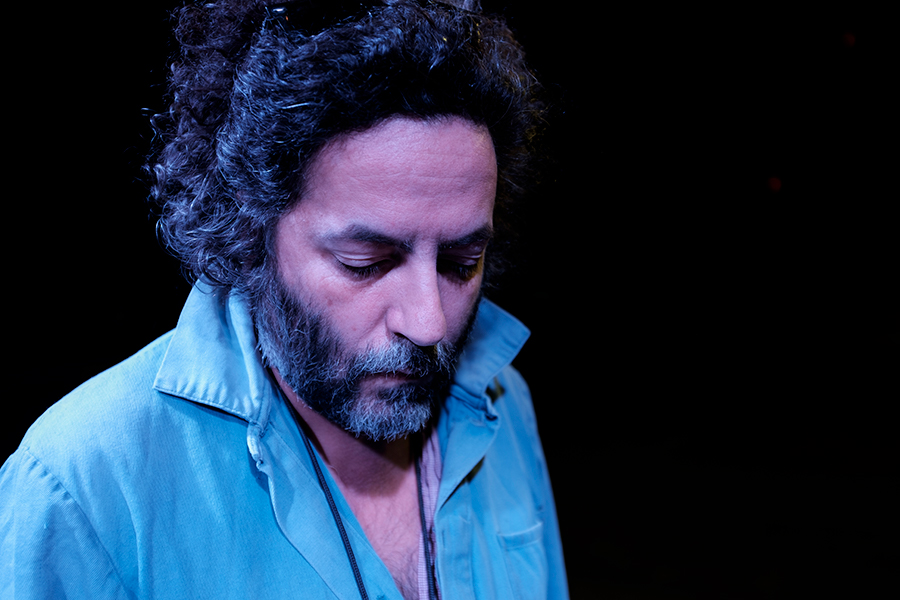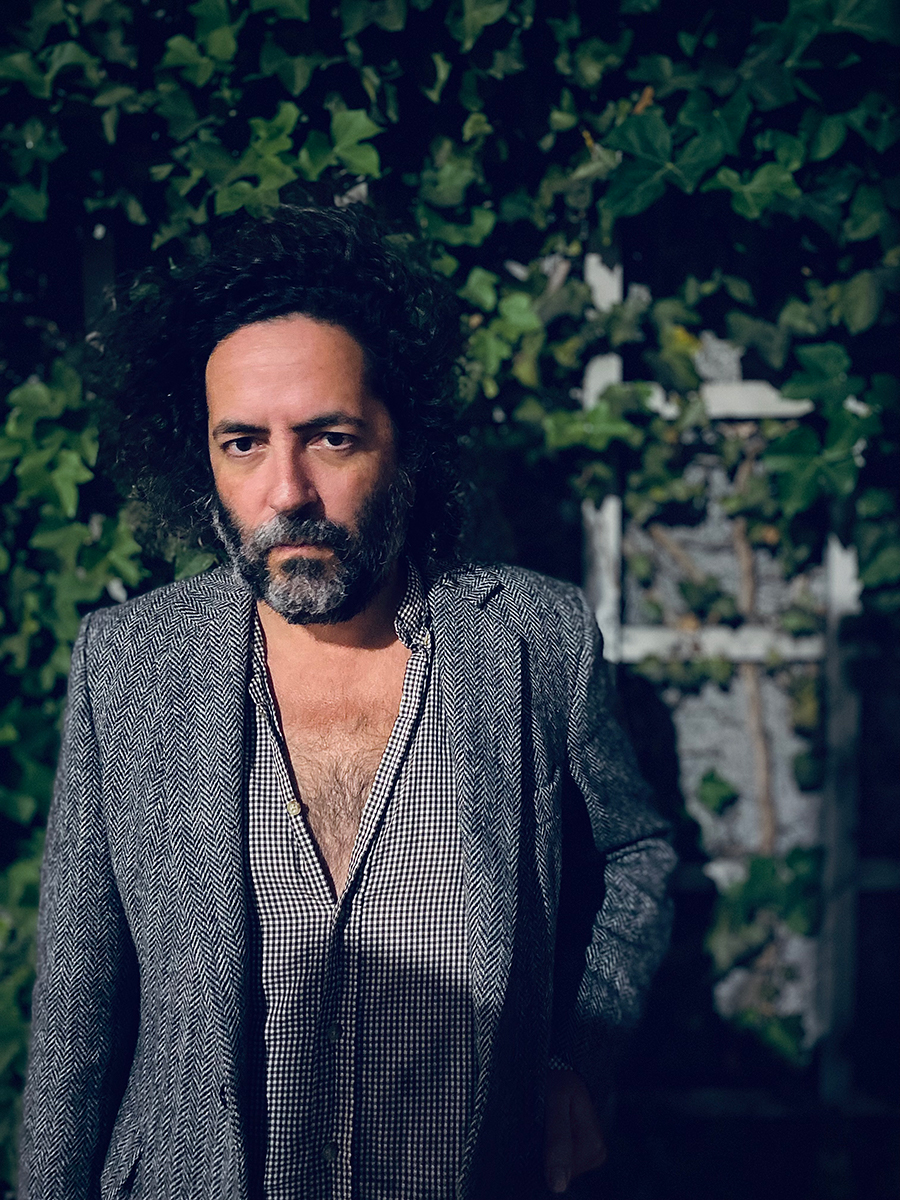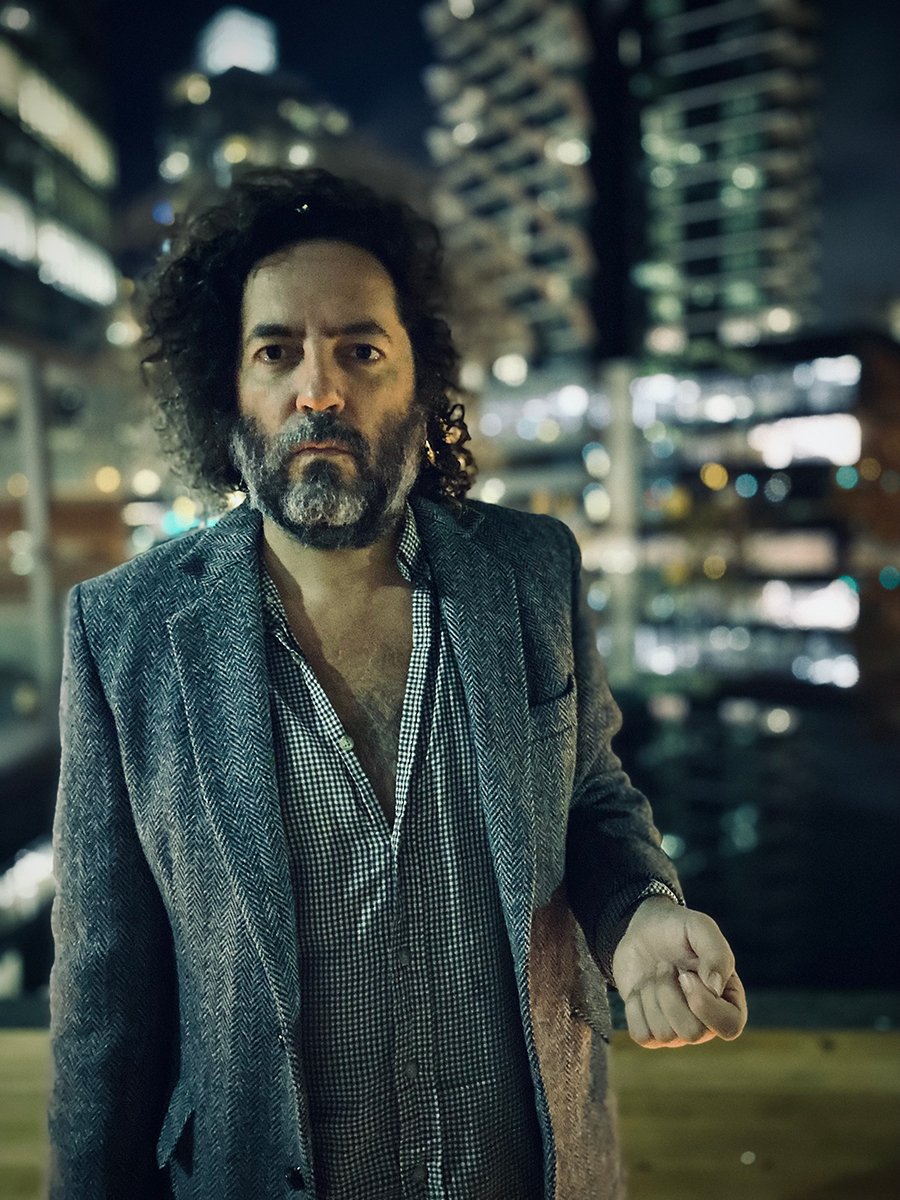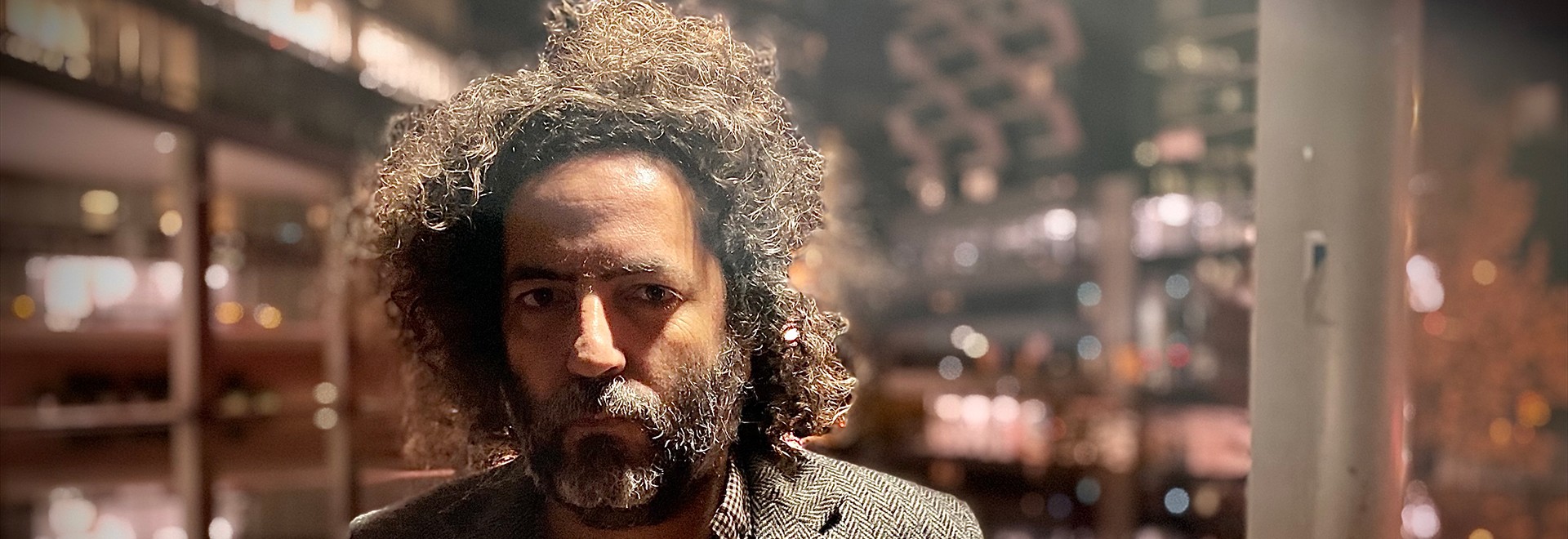Dan Bejar opened himself up and explored more of his creativity alongside his long-term collaborator John Collins.
Following the release of the menacing first single, Tintoretto, It’s For You, Destroyer’s Labyrinthitis is a suitably unusual journey through intoxicating narratives with new characters.
I caught up with Dan and he humbly allowed me to pick his inspired mind to learn more about Labyrinthitis.

HAPPY: Beautiful. So congratulations on Labyrinthitis! It is such an incredible album. Oh, my goodness. Talk about diverse. It’s just waves of every single emotion, you know? I mean, you’re well aware, it spans from these ballads to rock bangers and this disco-pop kind of hits and then an almost eerie soundscape. I just love it. It’s like watching a movie. I think you mentioned in the press release that you wrote all of the songs over a year, is that right?
DAN: Yeah. I mean, I think maybe less than that, it feels like most of it happens…. It’s weird. Time has become really fuzzy.
HAPPY: Fair enough.
DAN: But yeah, like summer, spring/summer of 2020 seems to be like where most of the writing happened and then kind of demoed stuff and started working with John later that winter, you know?
HAPPY: Yeah. It’s incredible to just write so, so many different kinds of music in such a short amount of time. I feel like a lot of people get stuck with one emotion or one event, you know, and people can write quite biographically, but it’s like I said, it’s like a movie. Do you have much experience… Do you write much in the way of prose?
DAN: Not really. You know, I do kind of like scribble stuff. But mostly I just kind of mutter things to myself and there’s like, little bits of melody, you know? And I’ll string those together and they’ll turn into a song. There is a kind of style of writing I do that the world doesn’t usually see. And I guess that song June is kind of an example of that. Like that second half where I’m just kind of doing spoken word, almost like a rap style, and it’s just like a bunch of disjointed language, like two-sentence kind of dramatic situations or like weird images. A lot of characters that kind of come out for a sentence and then disappear.
But not musical language, not melodic language. So it was cool to be able to do that. It kind of was… I was really nervous about it because I haven’t really done any kind of spoken word or rapping in my life. But it was kind of liberating. I know it’s kind of like a big takeaway for me from the album from doing it, it’s just like really fun just to have soundscapes and kind of read strange shit over top. You know, not worry about song structure or melody so much.
HAPPY: Yeah, totally. I’d be very interested in hearing more of that. Your lyrics are captivating, your music’s incredible. But yeah, your lyrics are very captivating. I can see someone just listening to your music and going off and writing the stories of all of these characters because you start them, you open them up. And it’s a really cool thing. Have you… let me preface this by saying I personally would consider this to be quite a compliment but have you ever been referred to as a musician’s musician?
DAN: I don’t think so, because I’m so crappy. Like I can’t play very well, and no one’s ever told me I was a good singer.
HAPPY: Oh my God.
DAN: So I feel like if I’ve ever gotten a compliment like that, it’s been, ‘Oh, yeah. Like he’s a good songwriter’, you know? But on a guitar or piano, I can barely hold my own. I’m really just good for stringing chords together. And even then, I have almost as little like zero interest in that. If I could write one chord songs, I would.
Yeah, I guess. I guess people have gotten used to my voice a little bit, you know, it used to be way more of a drunken cackle when I was younger. There’s a lot… I used to write a lot of words, so it was just like all me, all the time. Now there’s a quieter… there’s a bit more space for ambience or just like music, you know? Yeah, that’s kind of become more important for me. I don’t know. People seem to get off on the words. It’s what I write. It’s like how I build the songs as I write. I write the words first, and when I can sing them from beginning to end, then I start thinking about other stuff.
HAPPY: OK. I mean, I personally think you sound amazing. I really like the timbre of your voice. It’s great. I saw that…
DAN: Some people like it. Other people, no.
HAPPY: Well, maybe I’m alone, but I think it’s awesome. I can see why you’ve definitely… people are listening to your words because they’re really good. But I did want to mention, like the way you open the album, that driving the guitar line, you just said yourself that you’re not doing so much of that. But I know obviously, you’ve got some creative control over everything. It reminded me a lot of Disintegration by The Cure.
DAN: Yeah, yeah.
HAPPY: Are you a fan of The Cure?
DAN: Yeah. It’s something that I was a fan of as a teenager in the eighties. And then I took a long break and I would say maybe five years ago… Five or six years ago, I got really into Disintegration and haven’t really looked back, you know? I’m just like pretty serious with my fandom now. And that song was never supposed to really sound like that. But when John first started working on it with a demo I gave him, he had that kind of like high up the neck, kind of lead bass sound that the cure would do. Yeah. And I just fell for it instantly and we just started layering the song more and more, kind of just like a dense drone that The Cure were so good at.
It’s kind of a cool… it’s kind of a dreamy song. And I wanted it to be the first song because the rest of the album isn’t really like that. Or I find it not so much like that. I find like the songs kind of get more mean spirited, you know, kind of like weird gags. They get faster. The arrangements kind of get more cartoonish. And it’s not till like the very last song where it’s just me and the guitar, where you get another pause for breath.
HAPPY: Yeah, yeah, totally. Well, you said that you both, you and John, were listening to a lot of disco that was influencing the album.
DAN: I don’t know where that came from. I gotta see this press release one of these days.
HAPPY: Hahaha! Yeah, OK.
DAN: But no, don’t get me wrong. That’s a big thing for me and John. I think when we first started talking about doing a record again, we wanted to do like a really traditional four on the floor techno record. Like just like the club music, you know, just like stuttering synths, loud kick drum, loud bass and me singing, maybe no song breaks, just like an entire side of music like that. That fell by the wayside really fast. Because we’re old men, we’re not club kids, and we just didn’t know how to do that.
But that being said, the tempo stayed upbeat, and it’s a really like bass-heavy record, which is like, I think important for a certain disco vibe. You know, there’s one song where I know John was really trying to channel Earth, Wind & Fire. But I mean, disco for me is always like not really disco. It always ends up sounding like New Order or something like that.

HAPPY: I mean, that’s awesome. It’s definitely stuff that you could still dance to, and I don’t know the club scene that much, but I can imagine there would be places for it because it’s fun. It’s very fun music.
DAN: If people did, I’d be happy.
HAPPY: Absolutely. So the single, I think you released it… I mean, I’m not sure if it was the first single from the album, but Tintoretto, It’s For You. It’s been stuck in my head since you put it out. I was actually just singing it to myself this morning and I was like, ‘Oh yeah, I have that interview today’. So very, very cool. So that’s about a painter? Are you a big fan of visual arts? Or what’s your history with art in general?
DAN: I don’t really have much of one. I think I… I don’t know where that song comes from, honestly, I feel like I had that phrase in my head. It’s like the only time I’ve ever had like probably a title and then written the song down from the title. I don’t normally work that way. Like I come up with titles at the very last second, just so that people have something to print on the album. But that one, I had the title and I just kind of like came up with these verses and would just continually stick Tintorettos for use and expression on the end.
And the verses more and more seem to be consistently about the grim reaper, about like death coming to visit you and it telling you your time’s up. And it doesn’t matter if you’re a great painter or if you’re just someone rolling on the street, you know, you go. I guess it’s for you… I mean, there’s a lot of images of like the phones ringing and like it’s like someone knocking on the door, you know? And it’s your time to go because you’re dead. It’s kind of a morbid song, but it’s also supposed to be jaunty and playful, but morbid and about death. It kind of reminded me of my youth where I would say, like as a pretentious young man, I would, like, drop the word, ‘Tintoretto’.
Like, I would pick an obscure painter to be like, ‘oh, I think I like Tintoretto.’ You know, knowing nothing about art, not really caring. I remember reading once that he was part of a school of painting called Mannerism, which I thought was like a kind of a cool expression. Like, I remember like 20, 25 years ago, I was thinking ‘Destroyer’s like Mannerist rock’, you know, just like stuff like that. I feel like the song in a lot of ways… I don’t know who would glom onto this. It’s making… it’s poking a lot of fun at some kind of human being that reminds me of myself. And also after poking fun it’s like, ‘Oh yeah, and by the way, you’re going to die.’ So it’s kind of like fun, but it’s supposed to be filled with dread as well.
HAPPY: I like that. It’s fun and mocking and kind of… I don’t know. I think that is a humbling thing that you learn, especially as you get older or you experience different people who do have that sense of arrogance, especially about art. We’re all just going to die anyway.
DAN: I don’t know. It’s also just like a kind of a beatnik rant, you know? It’s more… it became a really strange song for me once John really started working on it because it started taking on like an almost synth metal vibe that really aggro compared to what Destroyer normally sounds like. And so that was like shocking to me. And like, as the music advanced, I became less and less certain of what the hell the song was supposed to be about and who even the singer was. But that’s kind of a cool feeling to… yeah.
HAPPY: Yeah, you sound like a different character singing that song, which is…
DAN: Yeah. There are a lot of characters on this record. More than usual, if you like. I’m assuming voices on at least half of the songs on Labyrinthitis, which feels like a lot compared to other Destroyer albums where usually there are maybe a couple of songs that are like that.
HAPPY: I think it’s, you know, as a musician, I envy that because it’s so fun writing in different styles and for different people. But so often I think people find themselves like, ‘Oh, I couldn’t sing that’ or ‘I guess maybe someone else could do it’, but it would just be so fun to do it all.
DAN: Yeah, I think… I don’t know. I’ve just seen them as like… You know, like trailers for films that don’t exist, you know? So you get a couple of minutes and you kind of get a few choice lines and a few like grand panoramas and some drama and… I don’t know. You have like a limited time to get this vision across and it’s collage, so you use that. And part of that is sticking one or two lines in people’s mouths. But I’m all the people. So that’s the weird part.
HAPPY: Totally, it’s really cool. Do you have much in the way of plans for all live shows then? Like, will you be playing the whole album live any time soon?
DAN: I don’t know. Yeah, I don’t know. Like I haven’t… the band hasn’t been in the same room together for two years. Like we walked off stage in Nashville. That was about 24 hours after the pandemic was announced. We cancelled the last week of our tour. The drummer lives in Chicago and the keyboard player lives in Los Angeles. And we haven’t been together, so people just mailed in their parts for this album. So in a couple of weeks, everyone’s going to get to town and we’re going to see what happens. We’re going to play hard for a week or two and then we go live on a tour bus and travel around North America for a month, which seems insane. I don’t know. The current state of things feels really weird. But we’re going to do it.

HAPPY: Yeah, yeah, yeah. That’s exciting. Oh, my God. So you don’t know if you’ll be playing the album then, or you just…
DAN: We will. We will. Yeah, I don’t know. It’s strange songs and definitely, like, trying to replicate them won’t be the way, but the band’s like… The band has a vibe on stage and they have a way of making everything their own, you know? So we’ll play some of it. Some of it’s got to stick.
HAPPY: That’s exciting. I have a couple more questions. We’ll have to wrap up soon. I read that you had attended university when you were younger for three years. And there was this great quote where you said, ‘to my credit, I eventually dropped out. To my discredit. I waited three years to do it.’ I love that. I’m definitely someone who’s a big believer in learning from experience and whatever. So I guess I wanted to ask about your thoughts on studying at university, especially with arts.
DAN: Yeah, I had big hopes for it. You know, maybe I just had a bad experience. But I was like… It’s not what I thought I was going to be. I was also really lazy. Like I didn’t… Like, procrastinating on what I was supposed to be doing at university was probably one of the best things I did, because that’s how writing for me was kind of born. Like I used to write and write before I ever started doing music, just like pages of I don’t know what, maybe stuff that’s not too different from the kind of thing you hear on a Destroyer song, or at least in an early one. All to avoid actually doing what I was supposed to be doing. But I do think maybe there is people who teach at universities that could inspire you or maybe are like-minded souls who are into the same kind of stuff.
But I felt alone. It wasn’t until I left that I really started to blossom as a human being, and my form of blossoming was to seriously bottom out of society. But at least I found other people like that. And it’s when I left that I started just… I don’t know, hanging out with people that actually that did stuff. Like I discovered the music scene in the city that I lived in and actually discovered the city for the first time, exploring it. And part of me is like also who really knows what they’re supposed to be doing or want to do when they’re like 18 years old or something like that. So maybe I’ll go back as a senior. You know, maybe when I’m 65, I’ll go take a Shakespeare class.
HAPPY: That would be very fun. Awesome. I think I actually have to wrap it up now, but it’s been wonderful talking to you. Thank you so much.
DAN: Yeah. Nice to talk.
Labyrinthitis is out now.
Photos Supplied
Interview by Chloe Maddren.



